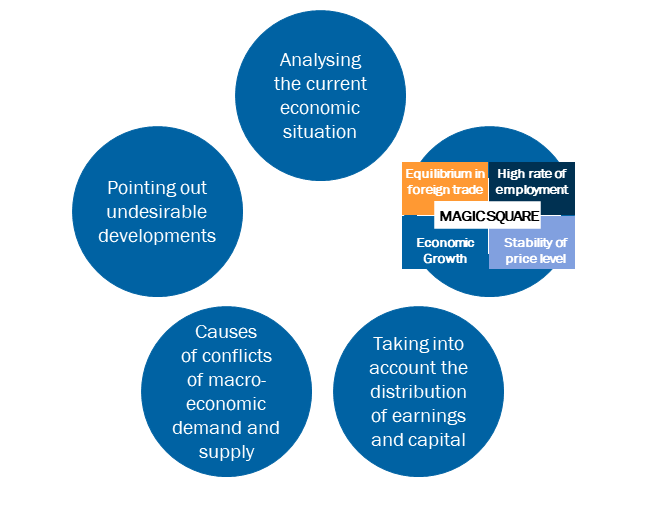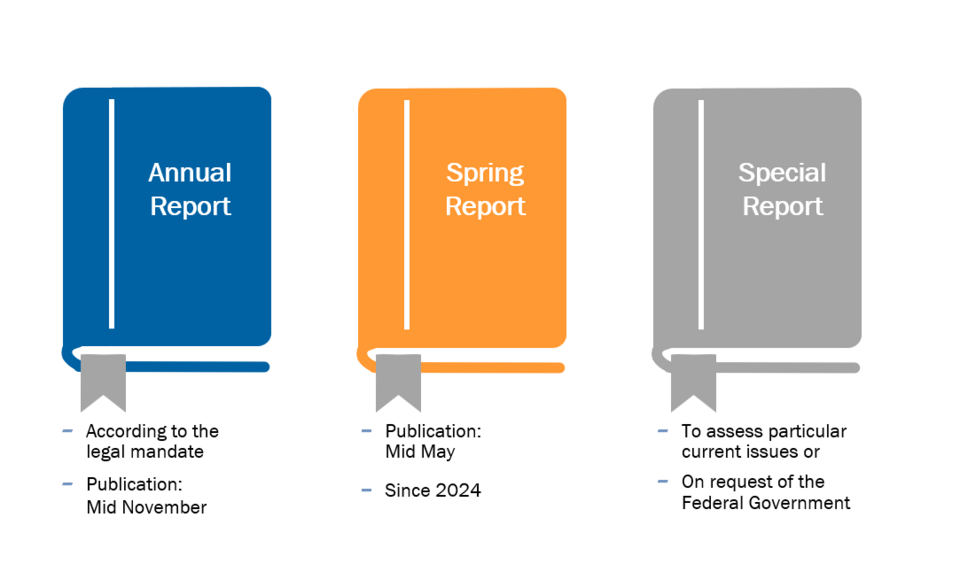Objectives and Tasks
The German Council of Economic Experts is an academic body that advises on economic policy issues. Set up by law in 1963, it is mandated with the task of providing an impartial expert view in the form of periodic assessments of macroeconomic developments in Germany, thus helping economic policymakers and the general public to make informed decisions. The Council is fully independent in its advisory role and operates in a transparent manner. It describes the current economic situation and its likely future development, highlighting any adverse trends and possible ways of averting or mitigating them. To this end it discusses various indicators of economic output, quality of life, sustainability, and politically defined targets. It also analyses the progress, opportunities and risks of current economic policies and identifies potentially conflicting objectives. The Council’s reports and assessments form a key part of the economic policy debate in Germany and have significantly influenced the political decision-making process.

The following is a list of the Council's individual tasks according to its legal mandate:
- Analysing the current economic situation and its likely development.
- Examining ways and means of ensuring steady and adequate growth within the framework of the free market-economy system, whilst simultaneously maintaining high employment, price stability and a foreign trade equilibrium.
- While taking into account the accumulation and distribution of earnings and capital.
- Pointing out the causes of current and potential conflicts of macroeconomic demand and supply.
- Pointing out undesirable developments and examining ways and means of avoiding or eliminating these without suggesting specific economic or socio-economic measures.
In line with its legal mandate, the Council compiles and publishes an Annual Report which is released in mid-November. In order to assess particular current problems and depending on the mandate issued by the government, the Council also prepares ad-hoc Special Reports. Since 2005, the Council has also been releasing Occasional Reports on selected topics upon the request of the Federal Government. Since 2014, the Council additionally publishes an updated Economic Outlook every March. The Economic Outlook is since 2024 part of the Spring Report, which is published in mid-May.

Since 1 August 2019 the German Council of Economic Experts has also been appointed as the National Productivity Board (NPB) of Germany. The basis of the NPBs is a recommendation issued by the Council of the European Union on 20 September 2016. The NPBs shall analyse developments in the field of productivity and competitiveness. This includes diagnoses of the long-term drivers of economic development, the conditions for increasing productivity and competitiveness, for example through the promotion of innovation, research and development, education, skills and training, and the capacity to attract investment, enterprises and human capital. A broad consultation process at national level and a regular exchange and intensive cooperation at European level should feed into the analysis. The German Council of Economic Experts has been addressing the issues of productivity and competitiveness in its annual reports since it was founded, and will give an additional analytical focus to these issues starting with the annual report 2019/20.
Organisation
The Council consists of five members who are specialists in the field of economic theory and economic policy. They are appointed every five years by the Federal President on the recommendation of the Federal Government. Reappointments are permitted. The Council then selects one of its members as chair for three years.
The Council is supported by a scientific staff chaired by a secretary general. Furthermore, the Council resorts to a liaision office at the Federal Statistical Office in matters of organisation and statistics.
